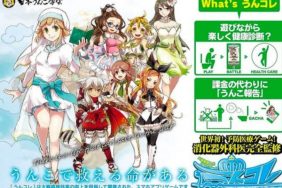The BBC’s Young Sex For Sale in Japan documentary has raised the ire of many anime fans, with them criticising presenter Stacey Dooley for allegedly being ignorant of Japanese culture.
The documentary, which is available to view on BBC iPlayer for those in the UK, sees Dooley travelling to Tokyo in order to explore Japan’s attitudes to underage sex, and the sexualised portrayal of young girls in anime and manga. Along with investigating the incredibly creepy, real-world fascination with young girls in the country that involves adult men paying to spend time talking to them in specialised bars, Dooley also places a spotlight upon ‘lolicon’, a sub-genre of anime/manga dedicated to erotic art featuring prepubescent girls.
Also: Facebook Failed to Remove Child Abuse Photos, Reported Journalists Who Investigated to the Cops
During the documentary Dooley talked to manga translator Dan Kanemitsu, who defended artists’ rights to create and sell art depicting prepubescent girls. During their conversation, Dooley picked up a book depicting a child-like character involved in a sexual act with an adult men. “Child pornography, at least by the broader definition of what is most offensive about it, is the fact that children are involved”, Kanemitsu argued. “So there’s a lot of debate about this, because on one hand there’s a child been harmed, and on the other hand there’s the depiction of a child being harmed [in anime/manga], and there’s a big difference between the two.”
“No actual child was harmed when they made this publication, I totally accept that, they are two separate things,” Dooley replied. “But do you worry that these images encourage and perhaps normalise child abuse?” Kanemitsu then argued that some people want to look at these images because it “plays out a fantasy separate from real life” and that it’s a “good venting mechanism.” He later added that “children need protecting” but that “lines of ink on paper do not”.

Stacey Dooley interviewed a photographer who specialised in “erotic” images of underage girls. (Image Credit: BBC)
The idea that lolicon anime and manga is actually providing some kind of service to pedophiles is disturbing, even if those who support the sale of such works believe that it would infringe upon “free speech” to prohibit them from appearing on store shelves. When Dooley expressed to Kanemitsu that she feared that it “encouraged and normalised real-life child abuse,” he replied: “If you start saying creations of the mind can influence peoples’ behaviour, and those creations should be held responsible as opposed to the people who are actually doing them, that is thought policing.”
Many anime and manga fans agree with Kanemitsu’s argument and have strongly criticised the documentary, with Girls und Panzer artist Takeshi Nogami claimed that he had a three-hour interview with Dooley that was cut from the final edit. In a series of tweets translated by Twitter user @walterinsect, Nogami reportedly claimed that Dooley had said: “All human beings are naturally innocent and have no dirty desires, and reading media depicting erotic, pedophilic, and gore contents will affect them to be corrupted”, with her allegedly adding: “My desire is to put all pedophiles and ones who produce pedophilic media into jail”.
Though these comments definitely seem at odds with the way Dooley presents her argument during the documentary, many have taken Nohami’s words verbatim and have condemned Dooley for apparently enforcing the UK’s views onto Japanese culture. The topic was also angrily debated by YouTuber The Anime Man, with his video garnering over 100,000 views:
Many including The Anime Man have raised the point that Dooley’s comments aren’t dissimilar from the argument against violent video games. Over the years, many people from parents to politicians have argued that video games such as Grand Theft Auto could have a real-world impact, and that underage children and teens playing these games could mimic their violence in reality.
However, comparing Dooley’s argument against the one espoused by critics of violent video games undermines the core reasoning behind her disapproval of lolicon — that men lusting over prepubescent girls is already catered to in Japan, and further normalisation of it through media is not helping those fighting against it. During the documentary, Dooley interviews a photographer who takes “erotic” photographs of young girls, with him stating that the youngest girl he has had on his set was just 6 years old. She also visits a café in which men can book private chats with literal high school girls, where the men are freely allowed to discuss topics of a sexual nature with them. These are completely legal activities in Japan, despite it putting these young girls in mental and physical danger.
In practically every country throughout the world it is acknowledged that engaging in violence will lead to you being punished by law. However, such is Japan’s lax attitude to the sexualisation of minors that the country’s laws arguably encourage complicity with pedophiles, and the continued prevalence of lolicon anime/manga helps propagate the idea that, as long as someone isn’t engaging in sexual activity with a minor, it’s all fair game.
Sexualised photos of children under the age of consent is legal if their genitalia or buttocks aren’t exposed, and young girls can be paid by companies to stand on the streets and attract men into buying their products. This means that artwork depicting the sexual abuse of minors, while ostensibly “victimless” as a result of no child being directly harmed, is still contributing to beliefs that are harmful to children in wider society.




